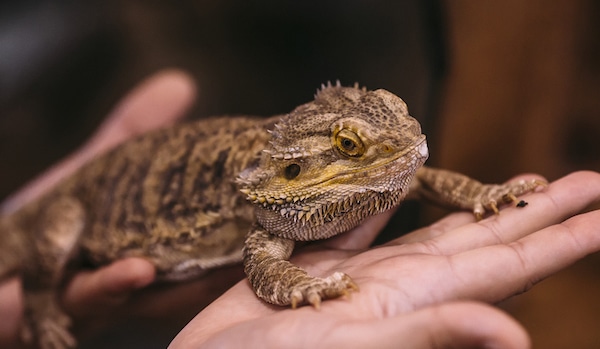
Introduction to Bearded Dragon Parasites
When you get a bearded dragon, parasites are probably the last thing you want to worry about. However, it’s an important topic to understand if you want to keep your bearded dragon happy and healthy. Like many reptiles, they can succumb to parasitic infections that impact their health. These tiny invaders can range from internal (endoparasite) parasites like worms to external (ectoparasites) parasites like mites. Not all parasites are harmful, though. Bearded dragons have low levels of parasites naturally found in their digestive tract. These parasites are relatively harmless but can become problematic if bearded dragons have weak immune systems or become stressed.
Knowing how to spot the signs of parasitic infections, treatment options, and preventative measures is essential and will be discussed in-depth in this article.
Understanding Parasites in Bearded Dragons
Bearded dragons can be affected by various types of parasites, including:
- Pinworms
- Ticks and mites
- Coccidia (Isospora amphiboluri)
- Giardia
- Nematodes
- Amebiasis
There is a difference between bearded dragons having a low level of naturally occurring parasites in their digestive tract and a parasitic infection. Parasitic infections are more serious and can cause more severe symptoms that require veterinary treatment. The severity of the infection can vary depending on the type of parasite and how difficult it is to treat.
According to VCA Animal Hospitals, pinworms and several types of motile protozoa parasites commonly reside in small numbers in a bearded dragon’s digestive system. Although these parasites may benefit from living in the digestive system, it is unlikely that it is harmful or beneficial to bearded dragons. They usually only become a problem in more significant numbers or bearded dragons with weak immune systems caused by stress or illness.
Despite the presence of these harmless parasites, it’s still unnecessary to routinely deworm bearded dragons unless otherwise advised by a veterinarian. This might be the norm for pets such as dogs and cats, but not bearded dragons. Treating for parasites should be done with the help of a reptile veterinarian, generally, if they show signs of a parasitic infection. The main signs of intestinal parasitic infections include diarrhea, weight loss, poor appetite, lethargy, or in severe cases, bloody stool and dehydration.
Mites and ticks are common external parasites that can affect bearded dragons. They live on the skin and can typically be seen moving around the neck area and skin folds. Signs of these parasites include skin irritation, itching, and dull skin or scales. The heavier the infestation, the more severe your bearded dragon’s symptoms will be.
How to Keep Your Bearded Dragon Healthy
Keeping your bearded dragon healthy is key to protecting them against parasites. Stress caused by illness and improper environmental conditions can weaken their immune system and make them more susceptible to parasitic infections.
Replicating Their Natural Habitat:
The best way to keep your bearded dragon healthy is to ensure their enclosure is set up to replicate their natural habitat. Adult bearded dragons are terrestrial and require spacious enclosures to thrive. The more space they have to move around in, the happier they will be. Humidity and temperature ranges should also replicate the conditions in their wild habitat.
Bearded dragons are cold-blooded (ectothermic) and need a basking lamp for warmth. The basking surface temperature should be about 107-113°F (42-45°C), with a cool zone surface temperature of 77-84°F (25-29°C) to allow for proper thermoregulation. Improper temperatures can cause stress and a weakened immune system, making it difficult for their body to fight off parasites naturally.
Furthermore, they need a UVB bulb for proper calcium absorption. This is essential for preventing metabolic bone disease, a serious condition that can put your bearded dragon’s health at risk.
The humidity levels should be maintained between 30-40%. Bearded dragons have adapted to dry climates, and too much humidity is bad for their skin and respiratory systems.
Hygiene and Enclosure Maintenance:
A clean and hygienic environment is crucial for preventing parasitic infestations. Parasites and other harmful pathogens, such as fungi and bacteria, thrive in unhygienic conditions. You should regularly spot-clean the enclosure daily or every other day. Spot cleaning involves washing food and water dishes, removing uneaten food, wiping soiled surfaces, and replacing small sections of soiled substrate. And, every 2-3 weeks, the enclosure should be deep cleaned, which includes replacing the substrate and thoroughly cleaning and disinfecting surfaces.
Monitoring Your Bearded Dragon for Changes
Physical and Behavioral Signs to Watch For:
- Changes in Behavior: Irritability or lethargy.
- Weight Loss: Noticeable decrease in body weight even with a healthy appetite.
- Skin Issues: Dull or discolored skin, sores, or lesions caused by parasite bites or irritation.
- Stool Changes: Diarrhea, watery or foul-smelling feces, sometimes with visible parasite eggs or larvae.
- Appetite Changes: Sudden reduced or increased interest in food.
- Visible Parasites: Mites and ticks can be seen moving around on the skin, leaving bite marks or eggs.
Keeping Records:
Keeping records of your bearded dragons’ normal behaviors, appetites, and weights can help detect parasites and other health issues early on. You can use an online record-keeping app or notebook to keep track of your bearded dragon’s feeding schedule, appetite, supplements, fecal consistency, weight changes, and enclosure temperatures. This is also great for noticing if anything has changed in the enclosure, like temperature fluctuations that could be responsible for any health issues.
Bearded Dragon Fecal Testing
When to Get a Fecal Test:
Fecal tests are the most common way to check for reptile internal parasites. A veterinarian typically does them to test for parasite eggs and larvae. Fecal tests are essential because they help to identify the specific type of parasites responsible for infections, allowing for a more effective treatment plan.
Any new or rescued bearded dragons should receive a fecal test during their health checkup at a veterinarian. This is important for preventing them from infecting other reptiles or pets in the home, even if they won’t be in direct contact with each other.
Fecal tests should also be done before your bearded dragon brumates. It’s risky for bearded dragons to enter brumation with high parasite loads because it can weaken their immune system. The parasites will eat from their fat stores and deplete their body of essential reserves to survive brumation.
Furthermore, fecal tests should be done during your bearded dragon’s routine health checkups at a veterinarian. If signs of harmful parasites are detected from the test, the vet will start a treatment plan to eradicate them.
How to Collect a Fecal Sample:
Fecal samples should be collected as advised by the veterinarian treating your bearded dragon. Generally, the vet will provide a sterile container for collection. The sample should be under 24 hours old to ensure it is fresh. You can keep the sample in the refrigerator if necessary, but that still doesn’t mean it should be stored for longer than 24 hours. Place the sterile container with the sample in a sealed plastic bag and take it to the clinic for testing.
What Happens During a Fecal Test?
The Fecal Float Method:
The fecal float method involves mixing the stool sample with a special solution that causes parasite eggs and larvae to float to the top. The vet will then examine the sample under a microscope to identify any parasites that may be present. Fecal float tests help determine the high parasite load and the specific parasites present. Afterward, the vet can administer an appropriate treatment based on the type of parasite and your bearded dragon’s symptoms.
Bearded Dragon Parasite Treatment Options
Treatment involves anthelmintic and antiprotozoal medications, typically as an injection (subcutaneous or intramuscular) or oral suspension. Medications will vary depending on the specific parasite being treated. Some common anthelmintic medications include Fenbendazole (Panacur), a broad-spectrum dewormer for internal parasites, and Ivermectin, effective against certain mites and nematodes.
It’s essential to only give medication to your bearded dragon under the guidance of a veterinarian rather than trying to treat them yourself or by using natural remedies. Natural home remedies may not be as effective as vet-prescribed medications, especially if your bearded dragon suffers from a parasitic infection or is very ill. The vet will also be able to administer the proper dosages of drugs to prevent overmedicating.
Best Practices for Preventing Parasite Transmission
Avoiding Cross-Contamination:
- Regularly clean tongs, carriers, and feeding tools in between uses.
- Avoid using the same tools or supplies in different enclosures without thoroughly disinfecting them.
- Never return loose insects from the enclosure to the feeder colony.
- Bathe reptiles separately and disinfect the bathing area in between uses.
- Never give leftover food from one reptile to another to finish; it’s better to dispose of it.
- Sanitize and rinse your hands and forearms thoroughly after handling each reptile.
- House new reptiles in quarantine separately from your healthy reptiles, ideally in a different room.
Proper Feeder Insect Care:
- Never feed wild-caught insects because they could be contaminated with parasites or other harmful pathogens. Only buy from a reputable pet store that sells feeders specifically for reptile consumption.
- Remove dead insects from the feeder colony.
- Provide good ventilation and avoid overheating or freezing them.
- Regularly change the substrate and remove uneaten food to prevent the buildup of harmful bacteria.
Good Hygiene Practices:
- Wash all greens thoroughly under warm water before feeding.
- Clean up fecal matter daily.
- Spot clean the enclosure daily or every other day and deep clean every 2-3 weeks.
- Replace sections of soiled substrate with fresh, clean substrate as necessary.
- Replace the water dish daily.
- Clean food and water dishes daily to prevent the buildup of harmful pathogens.
- Remove leftover food from the enclosure before it spoils.
- Disinfect the enclosure every 2-3 weeks using a veterinary-grade disinfectant.
Conclusion
Parasitic infections can be a serious health risk to bearded dragons, but with proper care and strict hygiene practices, this risk can be minimized. Regular fecal testing, monitoring for signs of parasitic infections, and maintaining a clean and hygienic enclosure are essential for preventing parasite infections. If you are concerned about your bearded dragon’s health or spot signs of parasites, you should consult a reptile vet for a proper diagnosis and treatment. Early detection is key to preventing serious parasitic infections and ensuring your bearded dragon has the best chance of recovery.



